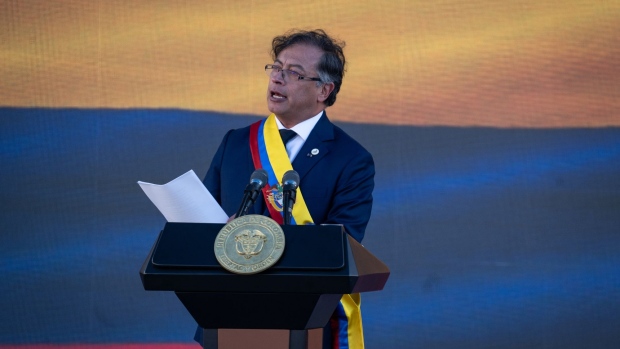Nov 8, 2022
Colombia’s Policy U-Turns Are Piling Up Under New Leftist Leader
, Bloomberg News

(Bloomberg) -- The first three months of the Gustavo Petro administration have been rough.
Time after time, the Colombian president or some high-ranking member of his team has publicly staked out a controversial position on economic policy, only to have some other cabinet member -- typically the finance minister, Jose Antonio Ocampo -- quickly walk back the idea after the currency and bonds tumbled.
The optimistic view is that these are just growing pains for a new, leftist administration trying to find the formula to enact sweeping changes to an economy it believes has concentrated far too much wealth at the top and has become far too dependent on fossil fuels. But given the hardline approach Petro appears determined to take -- and how millions of Colombians remain firmly behind him -- it’s also possible that the first three months are a prelude of what’s to come over the rest of his four-year term.
Here are the four most dramatic flip-flops from the Petro team so far:
Oil Drilling
Petro campaigned on a promise to end new oil exploration, and Mines and Energy Minister Irene Velez has repeatedly said there will be no new contracts.
Since fossil fuels account for about one half of exports, and a fifth of foreign direct investment and fiscal revenue, that made some investors nervous.
Ocampo said that, despite what his colleagues may have said, the government is still analyzing whether new oil exploration contracts are needed. Petro nonetheless, doubled down in a speech on Monday at the COP27 climate summit and said that the world needs to end its dependence on oil and coal, and that the climate crisis is a product of markets and the accumulation of capital.
Capital Controls
Petro aggravated the sell-off in Colombia’s bonds and currency with a series of tweets on Oct. 5, in which he criticized central bank interest rate increases and mulled a tax on capital outflows as a possible alternative. Ocampo tried to limit the damage the following day by saying “very emphatically” that capital controls aren’t being considered.
Later that month, Ocampo -- who sits on the central bank board -- voted for a one percentage point interest rate rise, apparently ignoring Petro’s wishes.
Foreign funds which have poured money into Colombia’s local debt market over the last decade became net sellers in October, for the first time in eleven months.
State Oil Company
Changes in state-controlled oil company Ecopetrol SA, are being closely monitored as investors seek to better understand Petro’s energy policy.
While still on the campaign trail, Petro said he planned to fire most of the board. However, when shareholders, of which the government is by far the biggest, chose a new board last month, many were surprised to see CEO Felipe Bayon reappointed, rather than someone close to Petro.
They also announced the former central bank co-director Carlos Gustavo Cano as chairman of the board, in regulatory filings in Colombia and the US. Analysts initially welcomed the announcements, but that optimism faded less than a day later when the company backtracked on Cano and named someone else instead.
Ocampo told reporters that the initial name had been announced prematurely. Citigroup Inc. said in a note the move sent “the wrong message and challenges the board of directors’ independence.”
Land Purchases
The presidency announced that Colombia will buy 3 million hectares (7.4 million acres) of land for poor farmers -- which Petro said could cost an estimated 60 trillion pesos ($13 billion) -- and that it might issue public debt to fund the purchases.
When asked in a press conference about plans to sell peso bonds, known as TES, for land purchases, Ocampo responded “I don’t know if the President said that or not but, in any case, at the Finance Ministry it’s clear that it cannot be done. You cannot buy land with TES.”
--With assistance from Oscar Medina.
©2022 Bloomberg L.P.






